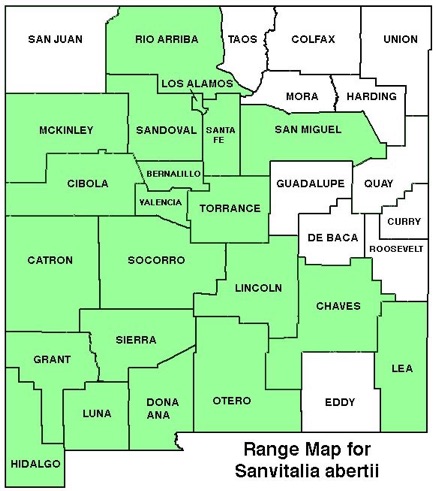WILDFLOWERS OF NEW MEXICO

Easy to overlook, except when it grows in mass and blankets broad areas, this low-growing plant with opposite branching, hairy stems seldom reaches 1-foot tall. Note the flower heads with a green, rounded dome of disk flowers and well-separated, tiny, yellow ray flowers with notched tips.
FLOWERS: July–October. Flower heads with 5–10 yellow, petal-like rays, each 1/16–1/8-inch long (2–3 mm), tip notched with 2 teeth; disk flowers yellowish-green.
LEAVES: Opposite. Blades linear to lance-shaped, 3/4–2 3/8-inches long (20–60 mm) to 1/2-inch wide (12 mm); surfaces rough-hairy, margins entire with tiny ciliate hairs (use lens). Leaves grow at right angles to slightly upward to stem.
HABITAT: Sandy, gravelly soils, drainage areas, roadsides, disturbed areas; desert grasslands and scrub, pinyon-juniper woodlands.
ELEVATION: 4,800–7,400 feet.
RANGE: AZ, CA, NM, TX.
SIMILAR SPECIES: The tiny, well-separated ray flowers and stiff-hairy, opposite leaves distinguish this member of the Aster family in NM.
NM COUNTIES: Widespread, except eastern plains, in low- to mid-elevation, dry habitats: Bernalillo, Catron, Chaves, Cibola, Dona Ana, Grant, Hidalgo, Lea, Lincoln, Luna, Los Alamos, McKinley, Otero, Rio Arriba, San Miguel, Sandoval, Santa Fe, Sierra, Socorro, Torrance, Valencia.

ABERT’S DOME (CREEPING ZINNIA)
SANVITALIA ABERTII
Aster Family, Asteraceae
Perennial herb

THE CONTENTS OF THIS WEBSITE ARE COPYRIGHTED AND CANNOT BE USED
WITHOUT PERMISSION OF GEORGE OXFORD MILLER





EMAIL ME